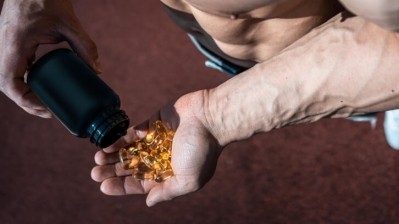Fish oil improves effect of BCAA supplementation on muscle function: Study

Citing previous research into the effects of BCAA supplementation on muscle recovery under a range of conditions, the study authors hypothesize that “combined BCAA and fish oil supplementation would have greater beneficial effects on the muscle damage after eccentric contractions (ECCs) compared with supplementation of either one alone.”
The research, published in the Journal of the International Society of Sports Nutrition, was developed with support from the Nippon Suisan Kaisha fishing company.
Fish oil and muscle recovery
Fish oil, including eicosapentaenoic acid (EPA) and docosahexaenoic acid (DHA), has been shown to lessen muscle soreness and improve strength and range of motion, possibly due to the anti-inflammatory properties of the omega-3 fatty acids.
“As for the mechanisms of the observed effects, it has been suggested that fish oil is incorporated into phospholipids, which are a major component of the cell membrane, and thereby inhibit the effects of inflammation and reactive oxygen species,” the researchers explained, adding that this follow-up study is the first to investigate the combined effects of BCAA and fish oil on muscle damage.
Previous studies from the same research team indicate that supplementation with fish oil alone over eight weeks “attenuates reductions in muscle strength and range of motion and increases in muscle soreness, creatine kinase and muscle stiffness following exercise involving ECCs.”
Study details
The double-blind, parallel study recruited 29 untrained young men and randomly assigned them to a placebo group, a BCAA supplement group and a combined BCAA and fish oil group. Previous studies largely demonstrate positive effects of BCAA supplementation on muscle recovery in participants who had undergone resistance training.
The control group and the BCAA group consumed a placebo pill daily, while the combined group consumed an EPA-rich fish oil (600 mg EPA and 260 mg DHA provided by Nippon Suisan Kaisha) for eight weeks before and for five days after the eccentric contractions. In addition, the BCAA group and the combined group consumed BCAA (9.6 g) for three days leading up to the test.
On test day, participants performed six sets of 10 eccentric contractions using dumbbells at 100% maximal voluntary contraction (MVC). Changes in MVC torque, range of motion, muscle soreness, upper circumference, muscle thickness, echo intensity and serum creatine kinase were assessed before, immediately after and for several days following the exercise experiment.
Findings
Both the BCAA and the combined group showed greater range of motion and lower muscle soreness after completing damaging exercise than the placebo group, and creatine kinase was significantly lower in the BCAA group than in the placebo group at five days after the test.
The study also determined that MVC torque was significantly higher in the combined group than in the placebo group immediately after the exercise but found no effect in the BCAA group.
“Considering these factors, BCAA alone does not appear to be sufficient for preventing reduced muscle strength after performing ECCs, and thus the results suggest that fish oil plays an important role in the protection of muscle function,” the study concluded, calling for further study.
Harry Rice, PhD, VP of Regulatory and Scientific Affairs, at the Global Organization for EPA and DHA Omega-3s (GOED), told NutraIngredients-USA he was intrigued with the study’s findings but was left with more questions, because the effect of EPA/DHA alone was not evaluated in the experiment.
“I suspect the results would not be similar based on prior results on fish oil alone from this research group, but we can't say with certainty unless all three treatments and a placebo are tested in the same experiment. By no means am I discounting the present results,” he added.
Source: Journal of the International Society of Sports Nutrition
“Omega-3 fatty acids enhance the beneficial effect of BCAA supplementation on muscle function following eccentric contractions”
doi: 10.1080/15502783.2022.2117994
Authors: Yosuke Tsuchiya et al.
















